General Secretary : Expanding controlled gold import rights to increase gold supply
General Secretary To Lam proposed to eliminate the State monopoly on gold bars in a controlled manner, expand controlled import rights to increase gold supply, and limit gold smuggling across the border.
On the afternoon of May 28, 2025, General Secretary To Lam worked with the Central Policy and Strategy Committee on mechanisms and policies to effectively manage the gold market in the coming time.
Head of the Central Policy and Strategy Committee Tran Luu Quang presented a report assessing and proposing mechanisms and policies to effectively manage the gold market in the coming time. The viewpoint of the Central Policy and Strategy Committee is to manage the gold market according to market principles, with appropriate management by the State; eliminate the mindset of banning if you can't manage it; respect ownership rights, property rights, and freedom of business; and ensure transparency in the market.
Regarding specific mechanisms and policies, the Central Policy and Strategy Committee proposed two groups of solutions, including solutions that need to be prioritized for immediate implementation and solutions that need to be researched for application or pilot application. The solutions need to be implemented step by step, with a clear roadmap and adjusted to suit reality. The most important thing is to build people's trust in the financial system and state policies, contributing to bringing gold resources to serve economic development.
General Secretary To Lam said that the mechanisms and policies for managing the gold market in Vietnam in recent years have been positively adjusted and improved. However, it is also necessary to frankly acknowledge that the mechanisms and policies for managing and regulating the gold market have been slow to be renewed, have not kept up with the development of the market and the demands of reality, and need to be urgently renewed and improved, as stated in the Report of the Central Policy and Strategy Committee.
Specifically, the gold market is poorly managed and not in line with the general supply and demand in the world market, causing consequences for the economy, especially gold smuggling and foreign currency outflows.
There is a monopoly in the market, which does not stimulate competition and promote healthy gold trading activities.
Management mechanisms and policies have not created the motivation to mobilize idle resources among the people for socio-economic development, so people invest a lot in gold.
Besides, the management method is still mainly traditional, slow to innovate, lacking modern business forms that keep up with world trends.
The General Secretary suggested that in the coming time, gold management needs to strongly shift from administrative thinking to disciplined market thinking, from "tighten to control" to "open to manage"; it is necessary to thoroughly grasp and eliminate the thinking of "if you cannot manage, then ban"; at the same time, it is necessary to make the gold market operate in accordance with market principles, with state management.
The General Secretary requested to avoid rigid intervention, restrict the movement and promote the advantages of the market, ensure the principle of respecting ownership rights, property rights, and freedom of business of people and enterprises; ensure transparency in the market. At the same time, it is necessary to identify people's gold storage as a form of savings and investment, a legitimate need, which needs to be respected and approached to build appropriate management mechanisms and policies based on this viewpoint.
The goal is to effectively manage the gold market, stabilize the macro-economy, and mobilize resources for socio-economic development.
The General Secretary also pointed out a number of tasks and solutions for the coming time.
Firstly, it is necessary to perfect the legal framework , quickly amend Decree 24/2012/ND-CP in the direction of marketization with a roadmap and strict control; creating a more effective connection between the domestic gold market and the international market.
Second, eliminate the State monopoly on gold bar brands in a controlled manner on the principle that the State still manages gold bar production activities, but can license many qualified enterprises to participate in gold bar production to create an environment of equal competition, thereby helping to diversify supply sources and stabilize prices.
Third, expand controlled import rights to increase gold supply, contributing to reducing the gap between domestic and world gold prices, and at the same time limiting gold smuggling across borders.
Fourth, encourage the development of the domestic gold jewelry market to gradually turn Vietnam into a center for manufacturing and exporting high-quality gold jewelry, transforming stored gold into products with added value.
Fifth, develop attractive alternative investment channels to mobilize gold from the population into the economy.
Sixth, improve management efficiency and inter-sectoral coordination, especially in preventing and combating gold smuggling.
Seventh, promote the role of the Gold Business Association, acting as a bridge between gold businesses and management agencies, promptly reflecting difficulties, making recommendations and coordinating the implementation of market stabilization measures when necessary.
Eighth, maintain macroeconomic stability and confidence in the Vietnamese currency, considering this a fundamental, long-term solution to convert resources from gold into economic development.
Ninth, promptly build an information and data system on the gold market to increase publicity and transparency, to collect taxes, manage, and assess the impact on the foreign exchange gold market, exchange rates, and different investment channels.
The General Secretary also emphasized the need to focus on studying a number of solutions for early and appropriate application with a roadmap. Specifically, research and refer to international experience to propose the establishment of a National Gold Exchange; or allow gold to be traded on the Commodity Exchange; or establish a Gold Trading Floor in the International Financial Center in Vietnam. Research and apply taxes on gold trading to improve market transparency, the ability of management agencies to monitor the market and limit gold trading for speculative purposes. In addition, research to eliminate export tax on gold jewelry to encourage the development of production and export of gold jewelry in Vietnam.
The State Bank Party Committee is assigned to preside over and coordinate with the Central Policy and Strategy Committee and relevant agencies to report and make specific proposals.
Import gold or set up a gold exchange to reduce price difference?
To reduce the gap between domestic and world gold prices, the only solution is to increase supply. However, whether allowing gold imports or setting up a gold exchange to solve the problem of increasing supply, the State Bank still faces many challenges.
Speaking at the Government Standing Committee meeting on gold market management last weekend, Prime Minister Pham Minh Chinh requested the State Bank of Vietnam (SBV) to quickly reduce the difference between domestic and international gold prices to only about 1-2%, and to research the formation of a gold trading floor in the direction that people can freely trade and buy and sell.
According to Dr. Le Xuan Nghia, an economic expert, to narrow the gap in gold prices, the best solution is to allow gold imports. “To solve the problem for the gold market, the current “best policy” is to allow gold imports, requiring importers to sell wholesale to retailers. The next option is to set up a gold trading floor, which is not allowed to sell retail. This is what China is doing, helping domestic gold prices not differ too much from the world market,” Mr. Nghia stated his opinion.
Contrary to the opinion that gold imports will cause foreign currency to bleed, Dr. Le Xuan Nghia estimates that Vietnam's gold demand is about 50 tons/year, equivalent to 3-4 billion USD. This figure is much smaller than the amount of foreign currency spent on importing foreign alcohol and cigarettes (8 billion USD/year). In addition, gold is an extremely important source of foreign exchange reserves, even "more valuable and stable" than USD, so it cannot be considered "bleeding".
Meanwhile, sharing with reporters, Mr. Shaokai Fan, Director of Asia-Pacific region (excluding China) and Director of Global Central Banks at the World Gold Council (WGC), said that the State Bank should calculate to import gold cautiously, on the basis of both allowing import and carefully assessing the impacts.
In April and May 2025, the domestic gold price was at times 18-20 million VND/tael more expensive than the world price. After the Prime Minister's directive, the price difference has now decreased to 14-15 million VND/tael.
Mr. Shaokai Fan emphasized that Vietnam is not the only country with a difference in gold prices compared to world prices, but this difference is too high and will be difficult to reduce if the State Bank does not have a solution to increase supply.
Dr. Dinh The Hien, Director of the Institute of Informatics and Applied Economics, also said that it is necessary to conduct comprehensive research on the total gold demand of the people each year, from which to calculate the reasonable amount of imported gold and grant import quotas to businesses. If the supply is regularly supplemented each year, the difference in gold prices will decrease. Currently, the price of gold in Vietnam is too high compared to the world price because Vietnam has not allowed gold imports for 14 years.
Regarding the issue of establishing a gold exchange, economic experts have many different opinions. Dr. Can Van Luc, chief economist of BIDV, said that the State Bank should review and re-evaluate the demand for gold and allow controlled gold imports. Particularly regarding the establishment of a gold exchange, if it is established according to the commodity exchange model, it is not appropriate because it will increase the "goldification" of the economy. Currently, many countries in the world no longer follow this model.
Associate Professor, Dr. Nguyen Huu Huan (Ho Chi Minh City University of Economics) recommends that if the gold exchange is oriented towards a hybrid model (both trading gold accounts and delivering physical gold), people will trade "gold credits" through accounts and will still be allowed to withdraw gold when needed.
However, even when applying this model, according to experts, the crux of the problem still comes back to the story of gold supply, because when people need to withdraw gold, gold shops are forced to have physical gold to supply, which means they still cannot avoid the need to import gold.
National Assembly delegate Tran Hoang Ngan suggested: “If the international financial center is implemented, commodity exchanges, including gold exchanges, can be established. Then, the problem of gold investment and speculation in the market will be solved.”
However, many experts also believe that many people still prefer to hold physical gold. Therefore, if a gold exchange is established and gold trading is allowed, it is unlikely to solve the problem at its root.
Recently, the Prime Minister requested to amend Decree 24/2012/ND-CP on gold trading in a shortened form to suit the situation, to be completed in June 2025; at the same time, review and build a database on the gold market, to be completed in June 2025.
In the long term, the Prime Minister assigned the State Bank, the Ministry of Finance and relevant agencies to continue improving the safe, favorable, healthy and attractive business environment so that people can actively promote production, business and start-ups, instead of storing gold; separate state management from gold production and trading activities; promote the production and processing of gold jewelry to create more jobs; strengthen information and communication work, and dispel the psychology of keeping gold among people.
PNJ has signs of violating tax laws and unfair competition.
The State Bank Inspectorate believes that PNJ has signs of violating tax laws. The State Bank has sent a document transferring the information to the competent authority for consideration and handling according to regulations.
The State Bank of Vietnam (SBV) has just officially issued an inspection conclusion on compliance with policies and laws in gold trading activities at Phu Nhuan Jewelry Joint Stock Company (PNJ; HoSE: PNJ).
In conclusion, PNJ basically complied with regulations in gold bar trading, posted prices as prescribed, reported data and implemented anti-money laundering regulations. However, this unit also had many serious violations and shortcomings.
Firstly, compliance with legal policies in gold trading activities: PNJ violated the reporting regime for gold bar buying and selling activities; showed signs of providing misleading information about products and goods provided by the enterprise to attract customers of other enterprises, related to unfair competition; showed signs of violating product labels according to regulations for gold jewelry and fine art products...
The verification results show that there are signs that PNJ has violated the provisions of the law on tax. Based on the provisions of the law, the State Bank has issued a document transferring the information to the competent authority for consideration and handling according to regulations.
Second, compliance with the law on anti-money laundering: PNJ violated the law on anti-money laundering, specifically: issued internal regulations with incomplete content as prescribed; did not classify customers according to risk level; reported insufficient content as prescribed by law; did not report large value transactions that must be reported related to gold trading activities; did not conduct internal audits on anti-money laundering as prescribed; had no regulations on freezing accounts, sealing, freezing or temporarily holding assets; had no specific instructions for conducting money laundering risk assessment; had no regulations on the authority to approve reports; forms of disseminating reports throughout the system; had no regulations on cases of customer identification; had no specific regulations on the frequency of updating customer identification information; had no regulations on collecting information on beneficial owners, the purpose and nature of the customer's business relationship with the reporting entity; PNJ does identify customers and store customer identification information, but not fully as required by law.
Third, compliance with legal regulations on accounting, making and using invoices and documents; on declaring and fulfilling tax obligations: PNJ violated the regulations on making sales invoices at the wrong time for some invoices; some transactions lack information or may not be the customer's ID card/CCCD number information on Table 01/TNDN;...
The cause was determined to be that the legal representative, leaders and employees of PNJ have not seriously complied with a number of legal regulations in gold trading, anti-money laundering and accounting, preparation and use of accounting documents, declaration and fulfillment of tax obligations.
Regarding handling measures, immediately after the direct inspection ended, the State Bank issued a document transferring information on the violation of the invoice regime, accounting documents, and taxes with signs of violating criminal law at PNJ to the Ministry of Public Security for verification, investigation, and handling.
At the same time, the Chief Inspector of the State Bank issued a Decision to impose administrative sanctions on PNJ for violations of legal regulations on information reporting regime for buying and selling gold bars and anti-money laundering activities with a total fine of more than VND 1.3 billion.
The State Bank also recommended that the company rectify and end its violations, and promptly address shortcomings to ensure compliance with the law. In addition, the State Bank requested relevant ministries and branches to improve the policy mechanism for managing gold trading activities.
Immediately after the State Bank announced the inspection results, PNJ affirmed that the company had proactively overcome all the points pointed out by the inspection team, helping the company to improve its operations from 2024.
The Company always tries its best to comply with and strictly comply with the State's regulations and laws in the gold and jewelry business. The Company also always promotes transparency and always tries to fully comply with the legal regulations on accounting, making and using invoices and documents; on declaring and fulfilling tax obligations.
PNJ has also proactively requested the authorities to take steps to investigate and clarify the unclear points recorded in the minutes. PNJ commits to continue to proactively cooperate in a professional and transparent manner with the authorities to quickly clarify and commits to continue serving customers with professionalism, dedication, care and the highest quality.
"PNJ hopes that gold market management will soon be implemented in a direction that helps the market develop healthily and sustainably in the long term, bringing benefits to consumers and the economy as recently directed by General Secretary To Lam in a working session with the Central Policy and Strategy Committee," said a PNJ representative.
Bao Tin Minh Chau was administratively fined 2.6 billion VND, the case was transferred to the police for investigation.
The Governor of the State Bank approved a report on a number of cases with signs of criminal law violations at Bao Tin Minh Chau Company Limited and sent a document transferring the information to the Ministry of Public Security for verification, investigation and handling.
The State Bank Inspectorate has just announced the conclusion of the inspection of compliance with policies and laws in gold trading activities at Bao Tin Minh Chau Company Limited.
According to the inspection conclusion, this company has violated the regulations on invoices, accounting documents, taxes, etc. in gold trading activities. The Inspectorate has reported and submitted to the Governor of the State Bank for approval and has sent a document transferring information about the violation to the Ministry of Public Security for verification, investigation and handling.
In addition, Bao Tin Minh Chau Company also violated the reporting regime on gold bar buying and selling activities and violated the gold selling transaction at a price higher than the listed price.
Bao Tin Minh Chau does not publish on the company's website information on transportation and delivery; does not publish on the website the process of receiving, responsibility for handling customer complaints and the mechanism for resolving disputes related to the signed contract;
Not developing and promulgating policies to ensure safety and security for the collection and use of consumers' personal information on the website; not developing policies to protect consumers' personal information on the home page of the e-commerce website.
Bao Tin Minh Chau Company has signs of providing misleading information about products and goods provided by the enterprise to attract customers of other enterprises, related to unfair competition.
Regarding compliance with legal regulations on anti-money laundering (AML) activities, the Inspectorate concluded that Bao Tin Minh Chau Company issued internal regulations on anti-money laundering (AML) without authority and without full content as prescribed; did not store information related to customers and transactions that must be reported...
Regarding the conclusion on compliance with legal regulations on accounting regime, preparation and use of invoices and documents; on declaration and implementation of tax obligations, the State Bank Inspectorate said that Bao Tin Minh Chau Company recorded gift expenses into the cost price of purchased goods and services in violation of regulations, leading to a reduction in the amount of value added tax payable;...
Immediately after the direct inspection ended, the State Bank Inspectorate reported a number of cases through the inspection of gold trading activities at Bao Tin Minh Chau Company that violated the law and had signs of violating criminal law. The Governor of the State Bank approved and sent a document transferring the information to the Ministry of Public Security for verification, investigation and handling.
The Chief Inspector of the State Bank of Vietnam has issued a Decision to impose administrative sanctions on Bao Tin Minh Chau Company related to a number of violations of regulations on anti-money laundering activities and reporting regimes on gold bar purchases and sales with a total fine of VND 2.64 billion.
The Inspectorate requested Bao Tin Minh Chau to immediately stop all administrative violations, seriously rectify and promptly overcome and correct shortcomings and violations in gold trading, anti-money laundering and tax laws, invoices and documents stated in the inspection conclusion.
At the same time, it is necessary to strictly comply with legal regulations on information reporting on gold bar purchase and sale data, listing gold purchase and sale prices, e-commerce activities, and use of digital technology in gold trading activities...
Dr. Le Xuan Nghia: The "best policy" is to allow gold imports.
According to Dr. Le Xuan Nghia, gold is an extremely important source of foreign currency reserves. Considering gold imports of 3-4 billion USD/year as foreign currency bleeding is unreasonable when importing alcohol and tobacco at 8 billion USD/year is also not considered “bleeding”.
Speaking at the Scientific Conference "The private economy is the most important driving force of the economy" on the morning of May 26, Dr. Le Xuan Nghia, an economic expert, expected that Resolution 68-NQ/TW would create a "big road" for private enterprises to develop.
For example, in the gold sector, according to experts, gold production and trading enterprises are currently eager to import gold to produce jewelry for export. However, many opinions say that "Vietnam is very special: people love gold too much", so the gold market must be tightly managed.
Responding to the view that gold imports will lead to “USD bleeding”, Dr. Le Xuan Nghia asked: gold is more precious than USD, so where does it “flow”?
In addition, according to this expert, banning gold imports also causes many other consequences, including gold smuggling. Due to banning gold imports, while businesses still need raw gold for production and trading, gold smuggling is inevitable.
“Gold imports are banned, but businesses still have to survive and do business. To do that, of course, gold and silver trading companies have to collect smuggled gold and gold from the people to process and sell,” said Dr. Le Xuan Nghia.
To solve the problem in the gold market, according to Dr. Le Xuan Nghia, the best policy is to allow gold imports and require importers to sell wholesale to retail businesses.
The Chinese policy is to allow 9 commercial banks and 4 gold trading companies to import gold, set up a trading floor, and set prices according to regulations. This floor is not allowed to sell retail. This is what China is doing, helping domestic gold prices not differ too much from the world market.
“Gold is an extremely important reserve. Every year, Vietnam only needs to import 3-4 billion USD worth of gold, but many people are worried about “foreign currency loss”, while importing foreign wine, cigars, and cigarettes worth up to 8 billion USD/year, no one talks about this issue, this is very unreasonable”, Dr. Nghia stated his opinion.
At the Government Standing Committee meeting on gold market management on the evening of May 24, Prime Minister Pham Minh Chinh requested the State Bank to strengthen state management, quickly reduce the difference between domestic and international gold prices to only about 1-2%, not over 10% as recently. At the same time, there must be solutions to increase supply such as many businesses operating together and reduce demand; strictly manage, control, strengthen inspection, check and prevent, strictly handle smuggling; prevent elements from manipulating, hoarding goods, raising prices, and disrupting the market.
The Prime Minister requested to amend Decree 24/2012/ND-CP on gold trading in a shortened form to suit the situation, to be completed in June 2025, and at the same time review and build a database on the gold market, to be completed in June 2025.
In the long term, the Prime Minister assigned the State Bank, the Ministry of Finance and relevant agencies to continue improving the safe, favorable, healthy and attractive business environment so that people can actively promote production, business and start-ups instead of storing gold; research and form a gold trading floor in the direction that people can freely trade and buy and sell; separate state management from gold production and trading activities; promote the production and processing of gold jewelry to create more jobs; strengthen information and communication work, relieve the psychology of keeping gold among people; research and invest in a system to create electronic invoices from cash registers in gold trading.
Tighten management to expose "ghost" business accounts
Faced with the recent rise in fraud using accounts of "ghost" businesses, the State Bank is about to apply a series of measures to prevent impersonation and fraud.
Recently, when the price of gold skyrocketed, the market has seen a number of scammers create websites and fan pages impersonating reputable businesses, mainly impersonating major gold trading brands such as Doji, Bao Tin Minh Chau, Phu Quy... with brand names and logos that are almost identical to the real ones, or copied from real company images; website addresses are so similar to those of reputable businesses that they are difficult to distinguish, causing visual confusion.
After that, these fake websites and fanpages post false information, entice customers to buy and sell at low prices, with high discounts, such as special offers, cheap gold sales, big promotions to celebrate business events, buying gold online in limited quantities with good discounts... After that, the subjects will lure customers to transfer money in advance to deposit to buy gold or make gold purchase transactions (transfer money to a personal account that does not match the business name). The scammers even send a "order" confirmation with a logo and information similar to the real business to create trust.
This situation is not new, but has appeared in the past year or so. After the State Bank of Vietnam (SBV) tightened management of personal accounts, requiring biometric authentication from July 1, 2024, scammers have switched to buying and selling corporate accounts for fraudulent purposes.
To prevent fraud using "ghost" business accounts, Mr. Pham Anh Tuan, Director of the Payment Department (SBV), said that according to the provisions of Circular 17/2024/TT-NHNN, from July 1, organizations and businesses will not be able to transact online without verifying the biometric information of the legal representative (must transact at the counter).
In addition, the State Bank is amending Circular 17/2024/TT-NHNN to strengthen control of organizational accounts. Accordingly, the State Bank will require the legal representative of the organization to come directly to the bank to open an account, not accepting any form of authorization. In addition, for newly established organizational accounts within 6-9 months (for the specific time, public comments will be sought), when making money transfers, the biometric information of the legal representative must be compared as with personal accounts.
The State Bank will also prohibit the use of Alias accounts (customer-specific transaction names). Previously, the Ministry of Public Security stated that Alias accounts cause a lot of confusion for money transferers. For example, an individual opens an account, then creates an Alias with a name like “national company” or “global”, causing the money transferer to look at the alias account, not the account number, and then think that they have transferred correctly.
According to the State Bank, the regulation on biometric authentication for business representatives does not disrupt the activities of legal representatives. In fact, almost no business owner does not have a personal account. All of these accounts were biometrically authenticated before July 1, 2024. "Those who do not come for authentication definitely have problems," Mr. Tuan affirmed.
Along with efforts to tighten account management, the State Bank is also coordinating with commercial banks and authorities to build a database of accounts that frequently conduct suspicious transactions. People/businesses will be warned when transferring money to these accounts.
BIDV Bank is the first unit to pilot the program from April 1, 2025. Up to now, over 100 billion VND in customers' accounts has been retained through suspicious account warnings.
From now until the end of July 2025, a series of major banks will deploy this service, including VietinBank, MB, and Agribank. After piloting at major banks, the State Bank will widely apply it throughout the system.
In addition, according to Mr. Vu Thanh Chung, Vice Chairman of the Board of Directors of MBBank, the MBBank app also has a scanning function to detect fake software. With this method, MBBank has blocked 99% of fake software on the phone.
Mr. Pham Anh Tuan also noted that banks need to regularly update the status of customers' accounts. For accounts suspected of fraud, but later verified as safe, they need to be removed from the list of suspects and allowed to trade normally.
Although risk prevention measures are being strengthened, the State Bank also admits that it is very difficult to completely prevent fraud. In the Draft Decree on administrative sanctions in the monetary and banking sector, the State Bank proposed a fine of up to 200 million VND for the act of renting, leasing, buying, selling, or opening bank cards for others. However, due to the huge profits from fraud, many people will still ignore it. In fact, there has been a situation of keeping people "renting faces" to transfer fraudulent money.
To act as a strong deterrent, the Ministry of Public Security has proposed amending the Penal Code. Accordingly, the act of leasing accounts, buying and selling bank cards, etc. can be criminally prosecuted, because it is considered an act of aiding and abetting financial fraud.
Bonds have not warmed up yet, real estate still depends on credit capital
Although real estate bond issuance has increased again since April 2025, it is concentrated in only one enterprise. Most real estate enterprises still have to depend on bank capital.
According to statistics from the Vietnam Bond Market Association, in the first half of May 2025 (as of the date of information announcement on May 16), there were 10 corporate bond issuances, with a total value of VND 10,450 billion. Banks are still the main issuer, with 6/10 issuances, but real estate bonds continue to recover.
The first half of May 2025 recorded 3 issuances by real estate enterprises, from Vingroup Corporation and Van Phu Real Estate Joint Stock Company, with a total issuance value of VND 4,150 billion (accounting for nearly 40% of the total value of corporate bonds issued in the first half of May 2025). Of which, the issuance value of Vingroup alone is VND 4,000 billion.
In the first 3 months of 2025, real estate bonds were completely frozen, but became active again in April 2025 with 4 issuances. Of which, 3 issuances from Vingroup with an issuance value of 9,000 billion VND, accounting for 80% of the total value of real estate bonds issued. This shows that the bond capital mobilization channel has not really been cleared, only concentrated in one enterprise.
While the amount of new issuance is not much, real estate enterprises are facing great pressure to restructure debt and mature bonds. According to VIS Rating, up to 73% of the 13,200 billion VND of new non-financial bonds issued in the first 4 months of the year were for debt restructuring purposes, mainly real estate bonds.
Since the beginning of the year, real estate companies have bought back about VND27,416 billion worth of bonds before maturity. From now until the end of the year, real estate companies have to mature nearly VND82,000 billion worth of bonds.
Due to capital difficulties, the number of real estate enterprises that are late in paying principal and interest on bonds continues to increase. Mr. Nguyen Ba Khuong, an analyst at VNDirect Securities Joint Stock Company, said that most of the more than 90 enterprises that are late in paying bond debt on the market are in the real estate group.
According to data from the State Bank, by the end of March 2025, outstanding real estate business credit reached more than VND 1,560 trillion, an increase of about 20% compared to the end of 2024 and 5-6 times higher than the overall credit growth rate of the whole system.
The financial reports for the first quarter of 2025 of 12 listed banks have detailed explanations showing that the real estate lending activities of these banks have increased sharply. At Techcombank, outstanding real estate loans account for nearly 34% of total outstanding loans and increased by nearly 15% compared to the end of last year. At PGBank, real estate loans increased by 34.4%, while this figure at VIB was 25%, at KienlongBank was 20.5%, HDBank increased by 17%...
Although banks assert that real estate credit is mainly poured into segments with "real demand", reputable businesses, projects with full legal documents, etc., in reality, the credit flow from the beginning of the year until now has mainly poured into high-end projects, the market is completely absent from the affordable housing segment.
Mr. Nguyen Van Dinh, Vice President of the Vietnam Real Estate Association, said that the credit pouring into high-end projects has caused the supply-demand balance in the market to become increasingly "out of sync" and at the same time increased risks for the banking industry. According to this expert, it is necessary to open up other capital mobilization channels for real estate businesses, especially the bond channel.
One alarming issue is that the debt/equity ratio is rising to its highest level since 2018. “It can be seen that financial pressure on real estate businesses will continue to be high in the coming time. This makes us expect the value of bond issuance to increase sharply in the last 3 quarters of the year,” said an expert from S&I Ratings.
In the context of the current strong increase in capital demand, analysts say that bond issuance by real estate investors will increase strongly again in the second half of the year. Specifically, according to VIS Rating, the issuance of real estate bonds will lead the non-financial bond market this year. Real estate investors will still benefit from easy access to credit from banks in the context of a favorable business environment in the industry.
Unblocking capital sources for the private economy
To develop the private economy, institutional breakthroughs are needed. In particular, unlocking capital resources to create favorable conditions for this sector is extremely necessary.
Pursuant to Resolution No. 68-NQ/TW dated May 4, 2025 of the Politburo on private economic development, many specific support policies for private enterprises have been approved by the National Assembly.
Resolution No. 198/2025/QH15 of the National Assembly on a number of special mechanisms and policies for private economic development clearly states that enterprises in the private economic sector, business households, and individual businesses are supported by the State with an interest rate of 2% when borrowing capital to implement green, circular projects and apply the environmental, social, and governance (ESG) standards framework. This is an important content to remove major obstacles for private enterprises, including micro-enterprises, business households, and individual businesses, which are limited in resources and have difficulty in borrowing capital, especially capital for investment in high-cost, long-term fields.
Dr. Nguyen Xuan Thanh, senior lecturer at the Fulbright School of Public Policy and Management, said that Vietnam is facing an urgent need to re-boost growth, in which the development of the private sector cannot stop at political messages, but requires specific institutional breakthroughs. Resolution No. 139/NQ-CP of the Government on the implementation plan of Resolution No. 198/2025/QH15 of the National Assembly has proposed many approaches to resources, such as access to land...
Regarding access to capital, according to Dr. Thanh, it is necessary to diversify credit channels, create conditions for the private economic sector to access capital sources, open up the corporate bond market, amend laws to expand the subjects of support and simplify loan procedures.
Pointing out the current “bottleneck” in implementation, Dr. Thanh emphasized: “Support must come from real resources, avoid repeating the mechanism of asking and giving, and absolutely should not create additional cumbersome monitoring apparatus.”
Associate Professor, Dr. Nghiem Thi Tha, General Secretary of the Vietnam Financial Consulting Association (VFCA), also said that in order for the private economic sector to develop sustainably, it is necessary to effectively and substantially unblock capital flows (both short-term and long-term). Regarding short-term capital sources, the private economic sector accounts for about 50% of the total outstanding debt of the entire banking system. However, small and medium-sized enterprises still have to pay commercial loan interest rates of about 9-11%/year, higher than the average in the ASEAN region (6-7%/year); the major difficulty lies in the ability to access credit, especially for individual business households.
In order to improve access to capital for private enterprises and support this sector to make a breakthrough, the State Bank of Vietnam said it will continue to operate a proactive monetary policy, control inflation, stabilize exchange rates, stabilize interest rates, contribute to creating a stable business environment; monitor, inspect and examine banks that increase deposit and lending interest rates.
According to experts, to improve access to credit capital, private enterprises need to increase transparency in financial management, especially accounting books, and strengthen governance capacity.
Data from the State Bank of Vietnam shows that by April 2025, the average lending interest rate for new transactions of banks will decrease by 0.6%/year compared to the end of 2024, creating conditions for private enterprises to reduce capital pressure in production and business. For 5 priority sectors (export, agriculture, high technology, small and medium enterprises, supporting industries), lending interest rates will be stable at 4%/year.
Mr. Tu Tien Phat, General Director of ACB, said that the 2% interest rate support mechanism for small businesses, innovation and ESG application is very necessary, but in reality, the implementation still faces many barriers, both from banks and businesses. Therefore, it is necessary to have more synchronous solutions, reduce administrative procedures, digitize credit granting processes and develop a more detailed green credit framework. “As a private bank, we understand the transformation process of the private economic sector. Businesses are very willing to invest and innovate, but they need to see the specificity and transparency in policies,” Mr. Phat shared.
At Agribank, the total outstanding loan balance of the Bank currently reaches more than 1.7 million billion VND, of which more than 60% is allocated to the agricultural, rural and farmer sectors, with the main customer group being private economic households. Agribank Deputy General Director Phung Thi Binh said that of the nearly 500,000 billion VND outstanding loan balance for legal customers, up to 90% belongs to private enterprises. According to the assigned plan, in 2025, Agribank is allocated a credit growth limit of 13%, equivalent to about 230,000 billion VND will be put into circulation and the Bank determined that it will mainly lend to customers in the private economic sector.
List of banks that will call for more foreign capital
Many banks plan to call for more foreign capital in 2025 or next year to strengthen their financial capacity. This is also an opportunity for foreign investors.
The foreign investor ownership room at commercial banks (CBs) receiving compulsory transfers such as MB, HDBank, VPBank will be increased to 49% from May 19 according to Decree No. 69/2025/ND-CP amending and supplementing a number of articles of Decree No. 01/2014/ND-CP on foreign investors purchasing shares of credit institutions.
The total shareholding level of foreign investors in commercial banks receiving compulsory transfers (excluding commercial banks in which the State holds more than 50% of charter capital) may exceed 30%, but not exceed 49% of the charter capital of the commercial bank receiving compulsory transfers according to the approved plan and implemented within the term of the compulsory transfer plan.
Previously, in January 2025, the State Bank announced the transfer of GPBank to VPBank, DongABank to HDBank, and OceanBank to MB. Financial analysts said that the move to loosen foreign room is expected to create new space for HDBank, MB, and VPBank to mobilize strategic capital, serving the goal of strong asset growth and maintaining capital safety ratio in the context of increasing medium- and long-term capital demand.
VIS Rating believes that raising the foreign ownership ceiling is expected to create favorable conditions for banks to attract strategic investment, supporting strong asset growth. Notably, in the context that many banks set a target of total asset growth of over 25%/year, the need for additional capital is very urgent. It is estimated that if they do not increase equity capital or issue bonds to increase Tier 2 capital, the capital adequacy ratio (CAR) of HDBank, MB and VPBank may decrease by 150-300 basis points by the end of 2026.
Meanwhile, ACB Securities Company Limited commented that the new decree creates conditions for banks to issue additional capital to foreign shareholders, thereby accelerating the restructuring process. For example, MB is planning to contribute a maximum of VND5,000 billion to MBV Bank during the restructuring period. Other banks will likely have similar plans.
The latest updated figures show that foreign investors hold more than 1.4 billion shares of MB, equivalent to 23.24%. Currently, MB does not have any foreign strategic shareholders. MB leaders said that in seeking foreign strategic partners, MB sets a number of goals such as being able to quickly access technologies, business development know-how and advanced banking management, especially in areas where MB feels it is not strong. MB takes advantage of the experience, network knowledge, and customer base of partners to develop new markets; stabilize shareholders, ensure consensus and consistency in business development, and strategy implementation.
To meet the above goals, MB has set criteria such as giving priority to partners with good financial capacity, agreeing on goals and implementing strategies that are culturally appropriate and highly committed, avoiding conflicts of interest, ensuring long-term strategic cooperation for mutual development.
Notably, MB said that it could sell 100% of the transferee bank (renamed from OceanBank to MBV) to foreign investors. MB's Board of Directors proposed that shareholders assign the Board of Directors to research, find potential investors, decide on specific contents, implement the conversion of MBV's legal form and plans for capital contribution, capital increase, and handling of capital contributions and shares at the time according to the Compulsory Transfer Plan (approved and amended/supplemented), actual implementation and legal regulations of each period.
After receiving the transfer, the legal form will also change from a single-member LLC owned by the State (holding 100% of the charter capital) to a single-member LLC owned by MB. MB plans to contribute charter capital to MBV with an amount not exceeding VND 5,000 billion.
VIB Chairman Dang Khac Vy said that currently, the foreign room at VIB is 25% empty and the bank is looking for a foreign partner after parting ways with strategic shareholder Commonwealth Bank of Australia (CBA) in the first quarter of 2025.
CBA began investing in VIB in 2010 with an initial stake of 15% and increased its ownership to 20% a year later. This strategic shareholder plays an important role in VIB's strategic transformation from a corporate bank to a professional retail bank. According to VIB's latest update on shareholders holding more than 1% of the bank's shares as of March 17, 2025, Pyn Elite Fund owns more than 57.65 million VIB shares, equivalent to 1.94%. As of March 20, foreign room at VIB was 4.99%. This is also one of the banks with the most foreign room in the Vietnamese banking system.
Experts predict that foreign capital will continue to flow strongly into the Vietnamese banking market. However, according to Dr. Le Anh Tuan, Deputy General Director of Dragon Capital, the biggest barrier for foreign investors when wanting to participate in banks is still the 30% maximum room limit. Meanwhile, not all banks currently have full room, so expanding the foreign room is an opportunity for both banks and investors.
Legalizing the right to seize assets: Clarifying the process and authority of credit institutions, avoiding abuse of power
While agreeing with the legalization of the right to seize collateral assets of credit institutions, National Assembly deputies requested that when seizing, humanity and human rights must be ensured. In reality, some credit institutions have abused their power, causing instability and disorder when seizing collateral assets.
One of the biggest new points of the draft Law on Credit Institutions (amended) this time is the legalization of 3 contents of Resolution 42/2017/QH 14, including the legalization of the right to seize collateral assets of credit institutions.
Discussing the Law on Credit Institutions (amended) on the morning of May 29, delegate Thai Quynh Mai Dung (Vinh Phuc) said that the above regulations will contribute to building a culture of respect for the law, speeding up the handling of bad debts, ensuring system safety, unlocking resources, and supporting growth. The delegate also appreciated the draft Law for clearly regulating the order and procedures for seizing collateral.
Delegate Nguyen Hai Nam (Hue City) also said that legalizing the right to seize collateral is necessary, in accordance with the principle of "borrowing and repaying".
Delegate Nguyen Hai Nam (Hue City). |
According to current regulations, banks wishing to seize collateral must go through the court and execute judgments with extremely complicated and lengthy processes and procedures. However, according to the draft Law, credit institutions are entitled to directly seize collateral if they have a prior agreement with the borrower, which will contribute to raising awareness of debt repayment and speeding up the process of handling bad debts.
Although the draft clearly stipulates the process and procedures for seizing real estate, delegate Nguyen Hai Nam also requested that credit institutions must ensure humanity and human rights when seizing real estate.
"In reality, there are still situations where many credit institutions abuse their power when seizing real estate, causing certain instability and disorder," the delegate warned.
Nguyen Huu Thong (Binh Thuan) also suggested that this provision be carefully considered because it may infringe upon citizens' legitimate ownership rights and recommended that the seizure of secured assets should only be allowed in cases where the guarantor has a clear agreement in the contract, the assets are not in dispute and are in the legal process of seizure. At the same time, it is necessary to specify the monitoring mechanism and the guarantor's right to appeal.
Delegate Pham Van Hoa (Dong Thap Delegation) supports the legalization of the right to seize assets, because if you borrow, you have the obligation to repay. If there is a contract on collateral between the two parties, when the customer cannot repay the debt, the bank has the right to sell the assets.
The delegate also suggested that if credit institutions and credit officers are found to be negative, they must be strictly handled according to regulations. The delegate cited that in the past, there have been many cases where the value of collateral and mortgaged assets was only 1 billion VND, but bank and credit institution officers lent up to 1.5 billion VND. When problems arose, the assets could only be auctioned off to recover 1 billion VND. Therefore, the delegate emphasized the need to strictly regulate the responsibilities of credit institutions and bank officers.
Regarding the regulation on the seizure of assets that are collateral, delegate Nguyen Huu Thong said that the draft regulation is reasonable, but may cause conflicts in the actual enforcement of judgments if the validity of the security contract and the time when the priority right arises are not clearly defined. Therefore, it is necessary to supplement the regulation on the principle of determining the priority validity of the security contract and the coordination mechanism between the civil enforcement agency and the credit institution to ensure transparent handling and avoid disputes.
Regarding the return of collateral assets in the form of exhibits and evidence (Article 198c of the Draft), delegates agreed because it would help resolve the situation of many collateral assets being "suspended" due to their involvement in criminal cases or administrative sanctions, causing delays in the process of handling bad debts of credit institutions. However, according to the provisions of the Law on Handling of Administrative Violations and the Criminal Procedure Code, the handling of exhibits is the right of the prosecution agency, not subject to the control of a third party; in addition, the draft has not yet specified a specific time limit for the return of assets after meeting the conditions, which can easily lead to delays and lack of responsibility. Therefore, delegates suggested reviewing the above provisions to ensure consistency.
Responding to the delegates' opinions, Governor of the State Bank of Vietnam Nguyen Thi Hong said that the draft Law has codified 3 contents of Resolution 42 to protect the legitimate rights and interests of the lenders, which is also to protect depositors, because the money that banks lend is essentially the people's deposits. In addition, ensuring property rights and the right to enforce contracts is also consistent with the spirit of Resolution 68.
Legalizing Resolution 42 will help facilitate the handling of bad debts, unblocking blocked capital flows, and helping capital flow to more borrowers.
“With rising bad debts, credit institutions will find it difficult to reduce lending rates because they have to increase risk provisions. By legalizing Resolution 42, bad debts will be handled quickly, and credit institutions can continue to reduce interest rates for businesses and people,” the Governor said.
In response to the opinions of delegates that it is necessary to clarify the procedures, regulations and powers of credit institutions in seizing collateral assets, avoiding abuse of power, especially avoiding pushing borrowers (owners of collateral assets) into a situation of having no place to live, the Governor affirmed that the State Bank will have specific instructions requiring credit institutions to have internal procedures to ensure that the seizing of collateral assets must be carried out in a transparent and legal manner, in order to ensure a balance of rights and legitimate interests of all parties.
Special loan with 0% interest rate: No worries about abuse when transferring power from the Prime Minister to the State Bank
Some National Assembly delegates are concerned that transferring the right to grant special loans with 0% interest rates from the Prime Minister to the State Bank of Vietnam (SBV) will create a mechanism of asking for and giving, abuse, etc., but the Governor affirmed that this cannot happen.
Discussing the Law on Credit Institutions (amended) on the morning of May 29, delegate Nguyen Huu Thong (Binh Thuan) said that transferring the right to provide special loans with 0% interest rate from the Prime Minister to the State Bank of Vietnam will clearly demonstrate the role of the State Bank in supporting credit institutions (CIs) in a particularly difficult situation, in order to maintain the safety of the financial and banking system.
Governor of the State Bank of Vietnam Nguyen Thi Hong. |
However, delegates are concerned that special loans with 0% interest rates without specific application conditions could lead to policy abuse, create risks, distort the competitive environment between credit institutions and increase pressure on the national budget.
Therefore, delegates proposed that it is necessary to specify in the direction: "0% interest rate only applies to credit institutions under special control, compulsory restructuring or having systemic impact on national financial stability". At the same time, supplement the mechanism to monitor, publicize and evaluate the effectiveness of the use of this special loan source.
Delegate Nguyen Thi Suu (Hue City) also proposed that it is necessary to clearly define the subjects and conditions to avoid abuse, and credit institutions prolonging the restructuring process to get 0% interest loans, causing disadvantages to the budget.
Similarly, delegate Nguyen Hai Nam (Hue) agreed with the decentralization and delegation of authority for special loans with 0% interest rate, transferring the decision-making authority from the Prime Minister to the State Bank. However, the delegate said that it is necessary to specify the conditions, mechanisms, processes, procedures, loan limits, responsibilities for loan management, etc.
“According to my projection, the demand for special loans is not small and lending always has risks. Large loans will affect the room for monetary policy management and capital for the economy. Therefore, should we also regulate the responsibilities of individuals and organizations when making special loans?”, delegate Nam asked.
Not worried about abuse and arbitrariness, delegate Nguyen Quang Huan (Binh Duong) said that, in fact, after the Law on Credit Institutions 2024 was promulgated, the State Bank issued Circular 37/2024/TT-NHNN with very detailed regulations on principles, subjects, conditions, procedures, etc. The delegate also agreed to give strong power to the State Bank to meet practical requirements. However, the delegate said that it should be regulated in the direction that the State Bank has the right to decide on special loans with 0% interest rate but must report to the Government at the nearest meeting.
Responding to the delegates' comments, SBV Governor Nguyen Thi Hong said that the 2017 Law on Credit Institutions stipulates that the SBV has the authority to decide on special loans. However, the 2024 Law on Credit Institutions transfers the authority to the Prime Minister.
Based on the constantly changing reality of domestic and international credit institutions, along with the continuous development of technology, mass cash withdrawal incidents can occur at any time, requiring quick handling. Therefore, in the draft Law on Credit Institutions (amended), the Government proposed transferring authority to the State Bank for quick and timely handling, meeting practical needs.
Responding to the concerns of the delegates, the Governor affirmed that special loans with 0% interest rate are not continuous but only happen in very special cases.
The Law on Credit Institutions 2024 has added many regulations for early detection, early intervention, and remote intervention with credit institutions. Accordingly, “problematic” credit institutions will be put into early intervention status, requiring shareholders to comply with a series of requirements of the management agency. If falling into early intervention status, in case of lack of liquidity, these credit institutions can still get special loans from the State Bank but must pay interest (not 0% interest loans).
“The special loan with 0% interest rate only applies to cases where credit institutions are subject to mass withdrawals, because once a mass withdrawal occurs, it can spread throughout the system,” said the Governor.
According to the Governor, it is very difficult to specify the conditions for special loans with 0% interest rate because in reality, each credit institution falls into a different situation in the market. In the US, there are banks that have been profitable for 2 consecutive years but mass withdrawals still occur. Mass withdrawals are often not due to weak credit institutions but sometimes due to rumors, technological problems, etc. When this incident occurs, it requires very quick handling.
Regarding special loans without collateral, according to the Governor, this case only occurs when the credit institution is really in difficulty and "runs out" of collateral. When granting special loans, the State Bank always requires first of all that there must be collateral, prioritizing assets with high liquidity (mortgage contracts for collateral for loans of credit institutions, government bonds held by that credit institution...).
Wave of changes in banking "hot seats"
Changes in senior personnel at many banks took place strongly before and after the 2025 general meeting of shareholders season of this industry.
The Board of Directors of Sacombank has approved the decision to dismiss Ms. Nguyen Duc Thach Diem from the position of General Director (continuing to hold the position of Permanent Vice Chairman of the Board of Directors) and appoint Mr. Nguyen Thanh Nhung as Acting General Director. Previously, Ms. Diem sent a farewell letter to staff after nearly 8 years as General Director of Sacombank.
“Today, I say goodbye to the position of General Director - the person directly steering the ship of operations to focus with the members of the Board of Directors on planning a new direction for Sacombank: Safety - Efficiency - Sustainability in the post-restructuring period”, Ms. Diem wrote.
In nearly 8 years under Ms. Diem's management, Sacombank has made a spectacular comeback with impressive growth in business indicators. Specifically, in the period 2016 - 2024, total assets increased by more than 125%, loans increased by 169%, total mobilization increased by 121%, pre-tax profit increased from 156 billion VND to more than 12,270 billion VND.
Acting General Director - Mr. Nguyen Thanh Nhung is a new factor at Sacombank, expected to inherit the achievements and lead Sacombank to continue to develop safely - effectively - sustainably, moving forward steadily on the restructuring journey. With more than 30 years of experience in key areas related to banking, Mr. Nhung has affirmed his management capacity through many important positions such as Deputy General Director of Eximbank and General Director of VietBank.
Meanwhile, at HDBank, Mr. Nguyen Huu Dang was recently appointed as General Director, and Mr. Pham Quoc Thanh (acting General Director) will hold the position of Vice Chairman of the Board of Directors for the 2022-2027 term from May 2025. The personnel adjustment is part of HDBank's plan (building the HD Financial Group model - a multi-functional, modern and sustainable banking and financial group according to the 5-year strategy 2025-2030).
Previously, on February 25, 2025, the State Bank approved the appointment of Mr. Vu Quoc Khanh as General Director of LPBank. On the same day, LPBank's Board of Directors met and agreed to appoint Mr. Khanh as CEO from February 25.
At the extraordinary General Meeting of Shareholders on March 7, 2025, Vietcombank elected Mr. Le Quang Vinh, Deputy General Director in charge of the Executive Board, as a member of the Board of Directors for the 2023-2028 term, and dismissed Mr. Nguyen My Hao, who had retired under the regime. On the same day, the bank also announced the decision to appoint Mr. Le Quang Vinh as General Director, the decision taking effect within 5 years from March 7, 2025.
Not only did some banks change senior executives, they also changed the "hot" chair of the Board of Directors. At the 2025 Annual General Meeting of Shareholders, PGBank elected 5 members of the Board of Directors. The Board of Directors held their first meeting and elected PGBank's Board of Directors Chairwoman, Ms. Cao Thi Thuy Nga, and Head of the Supervisory Board, Tran Ngoc Dung.
Meanwhile, after the 2025 Annual General Meeting of Shareholders, the Board of Directors of Eximbank for the 2025-2030 term held its first meeting to elect positions and assign specific tasks. Accordingly, Mr. Nguyen Canh Anh will continue to hold the position of Chairman of the Board of Directors for the 8th term (2025-2030), concurrently the Legal Representative of Eximbank from April 29, 2025; 2 members of the Board of Directors are Ms. Do Ha Phuong and Mr. Pham Tuan Anh; 2 independent members of the Board of Directors are Mr. Hoang The Hung and Ms. Pham Thi Huyen Trang.
When the 2025 Eximbank General Meeting of Shareholders took place, the market was abuzz with information about the possibility that Mr. Pham Tuan Anh, who has worked at Gelex for 26 years and is the former Chairman of the Board of Directors at many member companies in the Gelex system, would take the "hot" seat as Chairman of Eximbank. Gelex is currently a major shareholder owning 10% of Eximbank's capital.
Eximbank's Executive Board has 7 members, including Mr. Nguyen Hoang Hai as Acting General Director, along with 6 Deputy General Directors. Eximbank's Supervisory Board for the 8th term (2025 - 2030) met and agreed on the structure and positions of the Supervisory Board, with Mr. Nguyen Tri Trung as the Head of the Board.
A financial and securities expert said that changes in senior personnel at banks could directly affect the stock prices of these banks. However, financial and securities analysts said that by focusing on sustainable development strategies and restructuring activities, banks will continue to achieve positive results in the coming years.
Source: https://baodautu.vn/nhap-khau-vang-la-thuong-sach-trai-phieu-bat-dong-san-chua-am-lai-d293643.html


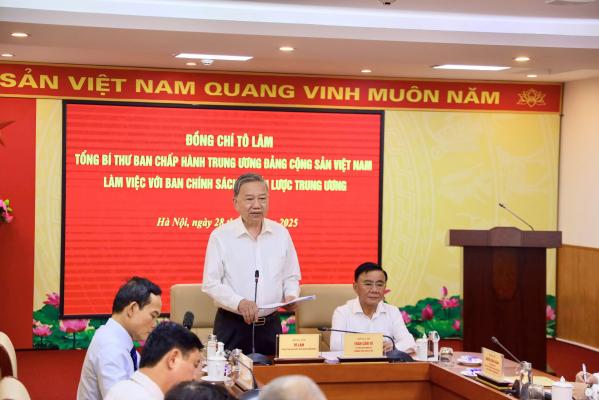
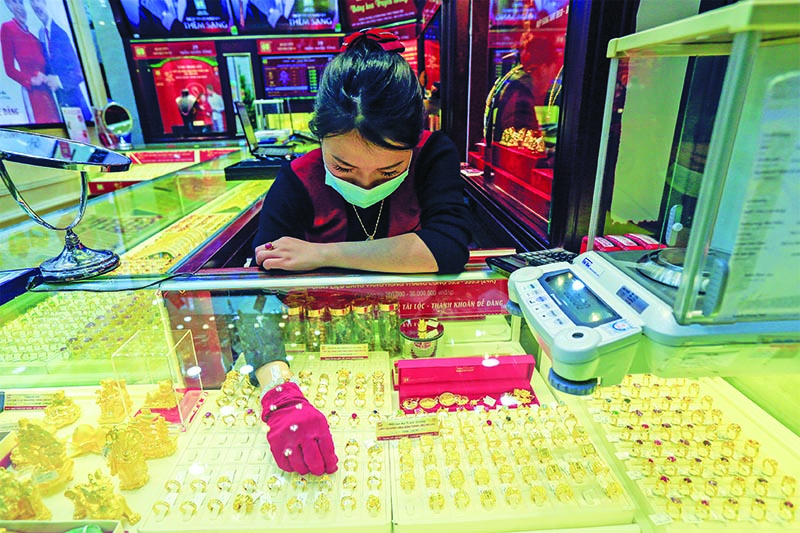
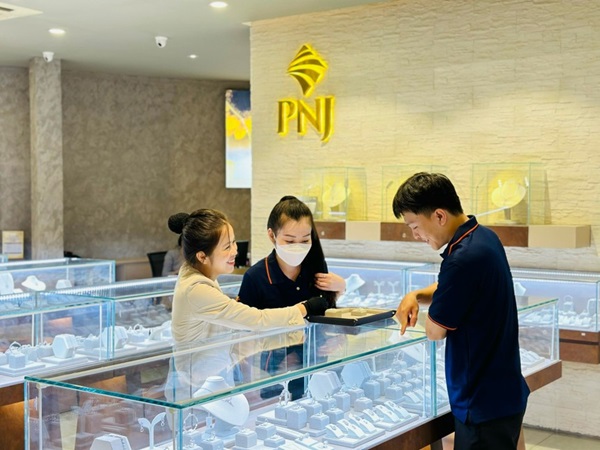
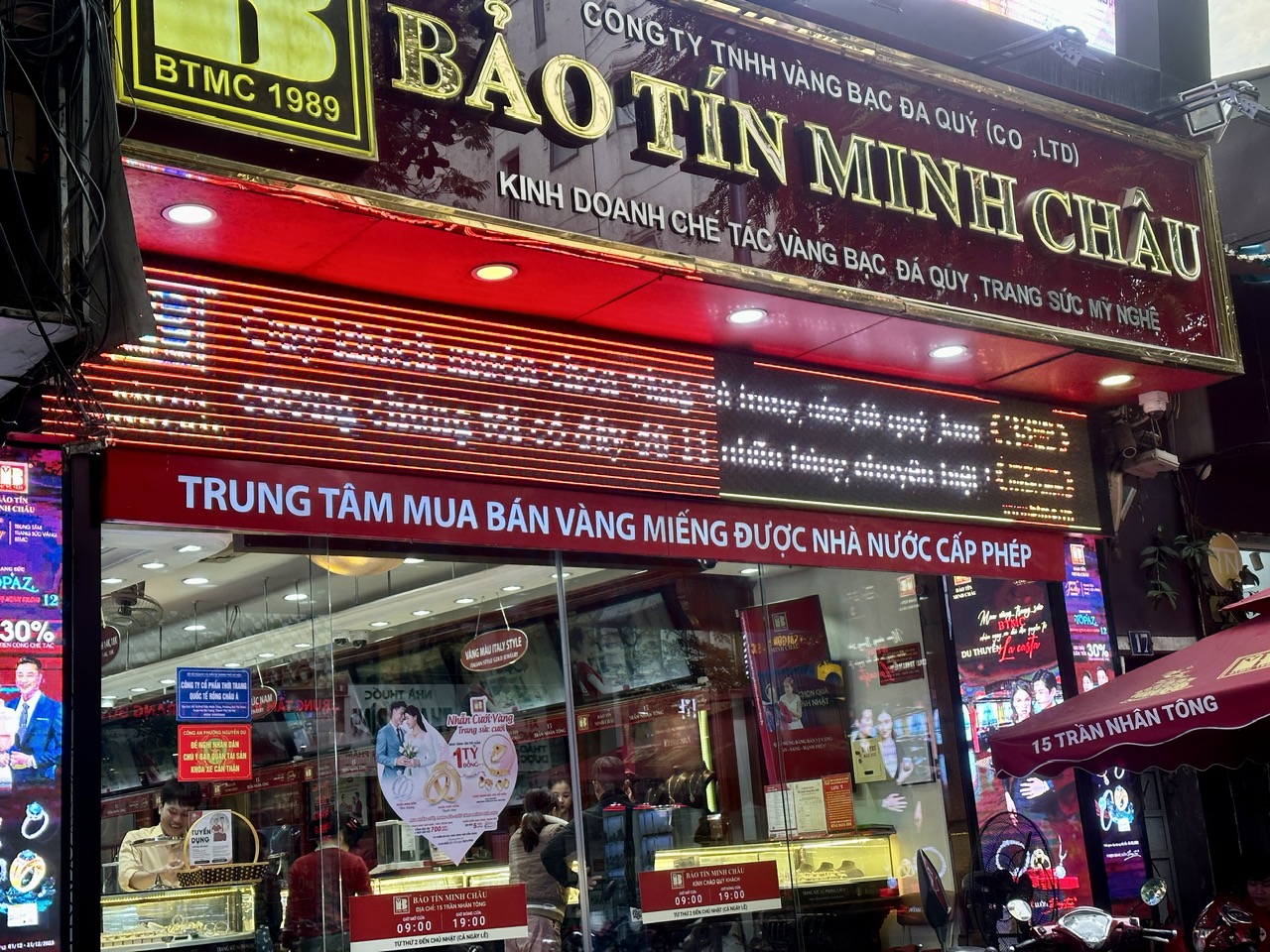
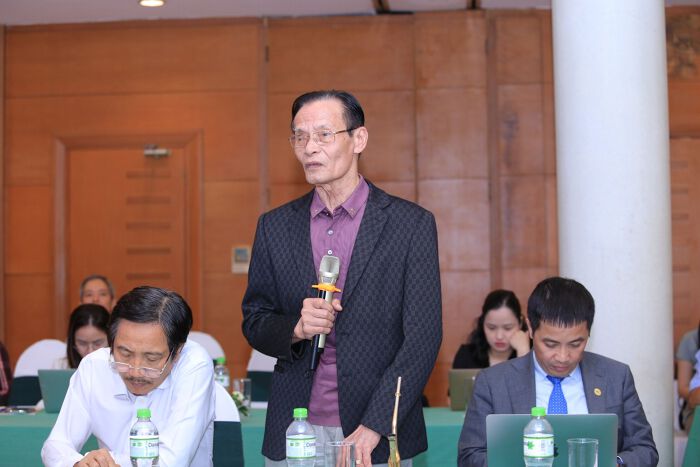

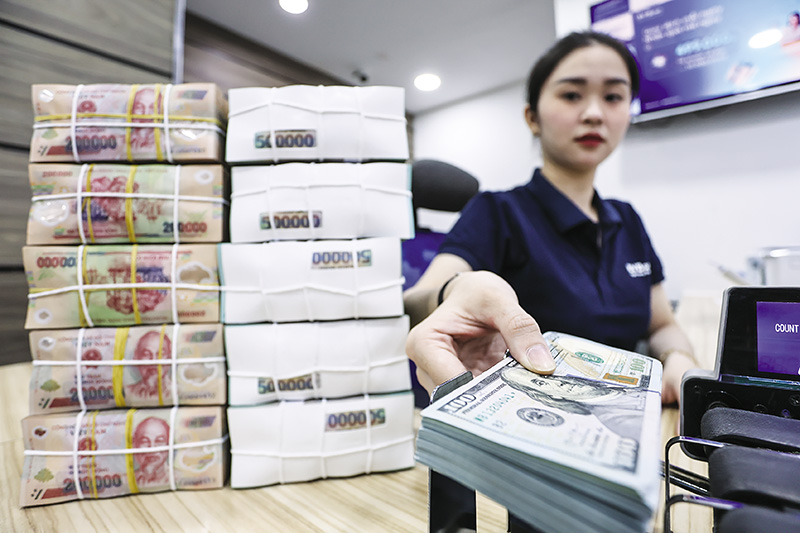
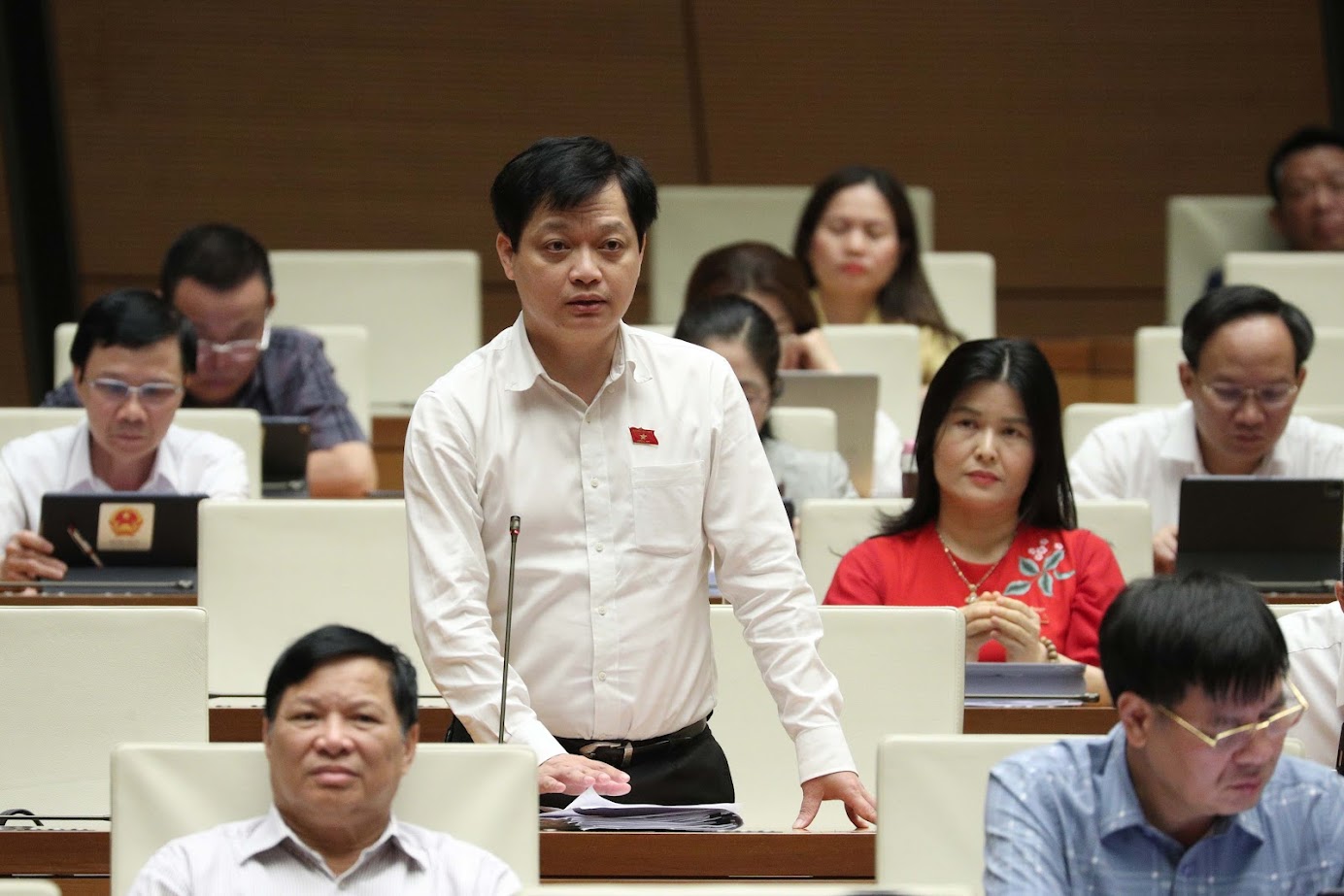
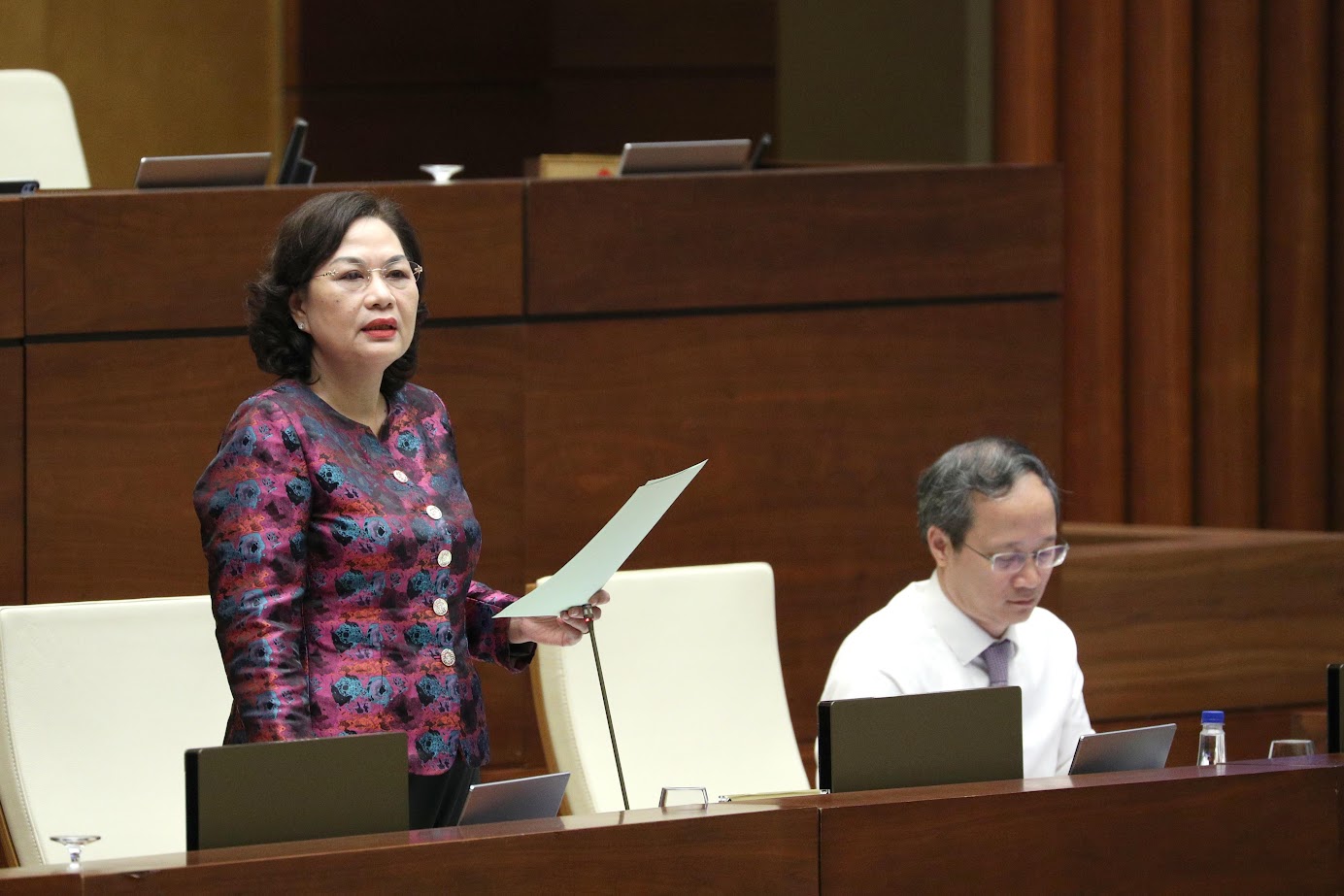
![[Photo] Prime Minister Pham Minh Chinh chaired a meeting of the Steering Committee on the arrangement of public service units under ministries, branches and localities.](https://vphoto.vietnam.vn/thumb/1200x675/vietnam/resource/IMAGE/2025/10/06/1759767137532_dsc-8743-jpg.webp)
![[Photo] Prime Minister Pham Minh Chinh chairs a meeting of the Government Standing Committee to remove obstacles for projects.](https://vphoto.vietnam.vn/thumb/1200x675/vietnam/resource/IMAGE/2025/10/06/1759768638313_dsc-9023-jpg.webp)








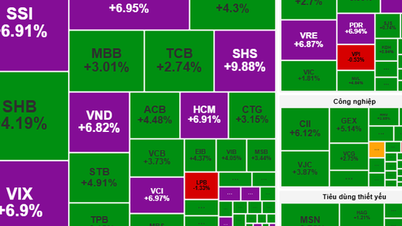















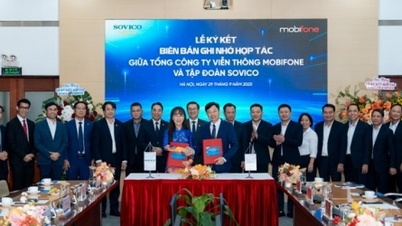

































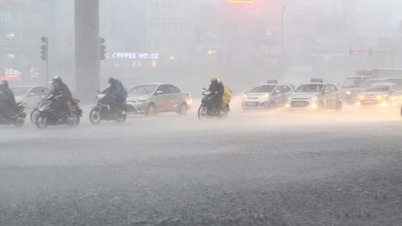






























Comment (0)